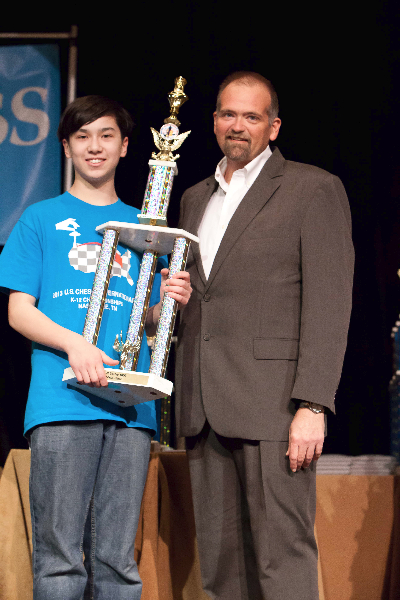[slideshow id=3]I just came back from the 2013 SuperNationals chess tournament!
To get to SuperNationals, which was in Nashville, Tennessee, my family and I had to take a 4 hour plane trip. Once we were in Nashville, we stayed in a gigantic hotel with over 5,000 other participants! The tournament itself lasted 3 whole days with 7 rounds total. Each round can last 4 hours.
My Performance
In my section (under 1000 rating), I tied for second place and got sixth place on tie breaks. Though this sounds really good, I was playing in a rather weak section, and should have gotten first place.

I got 6 points out of 7, which, as I said, wasn’t as good as the expected 7. And yes, 1 point is the difference between 1st place and 6th place. It would have been very easy to have done worse than I did, because to do worse, all I have to do is not try as hard, which is…very easy.
My Preparation
To prepare for SuperNationals, I did chess tactics on CT-Art, took chess lessons from a coach, and played a lot of practice games.
- Doing tactics on CT-Art has made me more aware of tactics, and has taught me patterns, so I see tactics quicker.
- My coach taught me about the importance of the two bishops, and how to get good minor pieces. He also gave me a larger repertoire of openings.
- Of course, playing many practice games allowed me to practice what I was learning, and find where I could improve.
I found that I performed much better at SuperNationals than I did during my training. I think there are several reasons for that. The first and most important is that I had much more motivation to do well. Also, I worked hard preparing for the tournament. And finally, there was actually less noise at SuperNationals (I’m usually distracted by noises). Even though there were more people, I couldn’t hear what they were saying.
My Lessons
After we came back from SuperNationals, I was thinking about the lessons that I learned, and I found multiple things.
First, winners do not rely on others to be weak. Winners care about their own performance, not other people’s performance. This basically means that winners will do their best, at whatever they’re doing, regardless of what other people do.
Also, I learned that you should set lots of achievable goals for yourself, and then not mess them up. I chose to compete in the “Under 1000” section, rather than the “open” section where the top 150 players have ratings over 1500. If I would’ve played in the open section, the best score I could’ve hoped to achieve would be about 4 wins and 3 losses. But, in the U-1000 section, if I don’t make any mistakes, I should have 7 wins and 0 losses. I have found in school, life, and chess that it’s better to set achievable goals and not make mistakes, rather than setting very high goals that are not achievable. Real life is more about not making mistakes than performing miracles.
As I wrote about in “Freddie Loses His Game,” if you are a learner, you are a winner. In the tournament, I lost the first game, which put me out of the running for the 1st place trophy. I could’ve quit, right then. But, I kept going and I won all the rest of the games. I learned the lesson in the first game that I should’ve been more careful. Being careful and not making mistakes has always been my challenge. True learning is “doing” what you learn. I am happy I am learning to be more careful and I am “doing” fewer and fewer mistakes. That’s why I play chess—to learn to do my best.
Remember, if you’re a learner, you’re a winner.